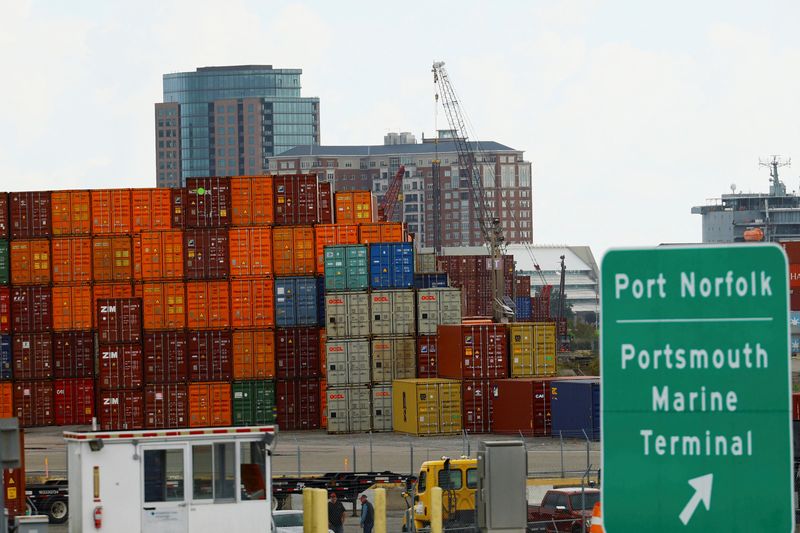By Doyinsola Oladipo and David Shepardson
NEW YORK/WASHINGTON (Reuters) – U.S. dockworkers and port operators have reached a tentative deal that would immediately end a three-day crippling strike that has shut down ships on the U.S. East Coast and Gulf Coast, both sides said on Thursday.
The tentative agreement is a 62% pay increase over six years, two sources familiar with the matter told Reuters, including workers on the picket line who heard the announcement. That would raise the average wage to $63 an hour from $39 an hour over the life of the contract.
The labor union International Longshoremen’s Association (ILA) is seeking a 77% increase while the employers’ group – the United States Maritime Alliance (USMX) – previously raised its offer for an increase of almost 50%.
The deal ends the largest work stoppage in nearly half a century, which has hampered the unloading of container ships from Maine to Texas and threatened shortages of everything from bananas to auto parts, causing a backlog of ships docked outside major ports.
The union and the port operator said in a statement that they will extend the master contract until January 15, 2025 to return to the bargaining table to discuss all outstanding issues.
“Effective immediately, all current work actions will cease and all work covered by the Master Contract will continue,” the statement said.
Among the main issues that cannot be resolved is automation which workers say will lead to job losses.
Union boss Harold Daggett said previously employers such as container ship operators Maersk and APM Terminals North America have not agreed to requests to end the port automation project that threatens jobs.
US President Joe Biden’s administration has sided with unions, putting pressure on port employers to raise their bids to secure a deal and citing the shipping industry’s bumper profits since the COVID-19 pandemic.
The tentative deal “represents critical progress toward a strong contract,” Biden said Thursday. “Collective bargaining works,” he added.
His administration has repeatedly rejected calls from business trade groups and Republican lawmakers to use federal power to end the strike — a move that would undermine Democratic support among unions ahead of the Nov. 5 presidential election.
The White House has been heavily involved in talks to reach a deal, sources said.
After several days, White House Chief of Staff Jeff Zients held a virtual meeting at 5:30 a.m. (0930 GMT) on Thursday with the CEOs of ocean carriers and impressed upon them the need to reopen ports to speed up hurricane recovery efforts, according to sources briefed on the matter. the event.
The port attack comes as southeastern countries struggle for supplies after a deadly typhoon.
Top White House economic adviser Lael Brainard told operators at the meeting that they needed a new deal to end the strike, and asked for a new deal on the table. By midday, the shippers had agreed to a higher bid.
Acting Secretary of Labor Julie Su told the operators they can ask the union and the leaders will agree to extend the contract, if the new offer is higher. He was in New Jersey to meet with union leaders to secure an agreement, the source said.
‘good news’
The ILA launched a strike by 45,000 dock workers, the first major work stoppage since 1977, on Tuesday after talks over a new six-year contract broke down.
At least 45 container ships that could not be unloaded were docked outside East Coast and Gulf Coast ports on Wednesday, up from just three before the strike began on Sunday, according to Everstream Analytics.
JP Morgan analysts said the attack would cost the US economy about $5 billion a day.
The attack affected 36 ports – including New York, Baltimore and Houston – that handle a wide range of containerized goods.
“The decision to end the current strike and allow East and Gulf coast ports to reopen is good news for the nation’s economy, the National Retail Federation said in a statement. “The sooner a (final) deal is reached, the better for all Americans. family.”

National Association of Manufacturers CEO Jay Timmons said that “cooler heads have prevailed and the ports will reopen” and called it “a win for all parties involved – keeping jobs, keeping the supply chain intact and preventing further economic disruption.”
Economists say the port closures will not raise consumer prices as companies have slowed shipments of key goods in recent months. However, a prolonged stoppage will follow, with food prices likely to react first, according to Morgan Stanley economists.




